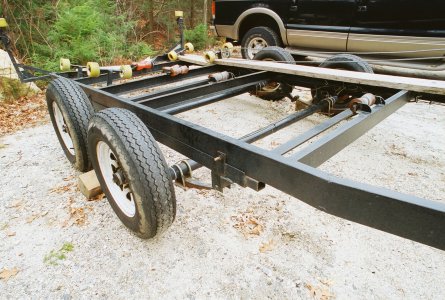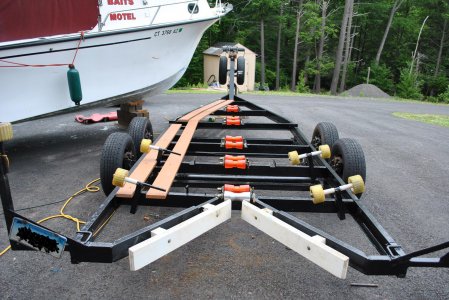- Joined
- Apr 29, 2019
- Messages
- 2,299
Most of the posts in this thread are giving good advice but not explaining the reasons for that advice. I know that telling me to do something just because I said so don't work, I need facts. I will try to explain some of the reasons for some of the issues that have been brought up.
A few thoughts from experience learned the hard way.
Electric brakes are great. I'm glad that you were on board with that from the beginning. When you get the brake controller for in the truck, make sure to get a progressive one. The progressive controller is able to sense how hard you are braking and modulate the power to the trailer brakes to keep everything in balance. The other type is just on/off. full brakes or no brakes, not real pleasant to use and hard on the both the truck and trailer with all of the yanking for and aft. Once the controller is properly adjusted I could actually stop faster with the RV hooked up than the truck by itself. Yet with it being progressive if I touched the brakes lightly just to slow down a bit I did not get the feeling the trailer was trying to pull the back of the truck off. A good controller will make the trailer feel like it is not even there as far as braking is concerned.
My first heavy trailer was a home-built car hauler. It came with the '69 Catalina that was on it. On the way home I learned real quick about trailer sway. At 35 MPH the trailer and my 1 ton full size 12 passenger van were going back and forth with the inside tires leaving the ground by about 18 inches, real close to going over. I knew better than to hit the brakes and I just let off the gas as and hung on tight until it slowed enough to get back under control. That trailer also had NO brakes, it was a challenge to bring it to a stop. The car was bound to the trailer by the tires, That meant the car was free to bounce around on its suspension. Every bump in the road was an adventure with the weight moving around even just a little. Water sloshing around will be a lot worse.
As for single vs dual axle. The laws of physics cannot be altered.
With a single axle when it encounters a say a 3 inch bump or hole it will follow the terrain. With a dual axle the fulcrum is located halfway between the axles. This means that when you go over that 3 inch bump or hole the front axle will move up 3 inches but the trailer will only move up 1.5 inches. This means that the load on the trailer and the welds and structure of the trailer will get exactly 1/2 of the abuse as they would have gotten from a single axle. Because of that same sharing effect weight distribution is a lot less critical on a 2 axle than it is on a single axle. You will also notice a big difference going up or down hill as with the high center of gravity will cause a significant weight shift to the front or back. With the load being water, this will be greatly amplified.
The load bard that have been referred to are more often called a weight distributing hitch. Many weight distributing hitches also come with an anti sway device. Since you will be hauling water that will be moving all over and messing with the weight and balance and center of gravity of the trailer I would absolutely have the weight distributing hitch with anti sway. When I towed my 6500 lb rv home after buying it, it came with a weight distributing hitch but my truck was not ready to accept it so I just used the 2" ball. It was not a pleasant ride home. that trailer fought me the whole way. Was way to much tung weight so the back of the truck was sagging which takes weight OFF of the front tires and I could feel that in the steering.
Depending on which hitch you have on your truck you need to look at its weight ratings. You want 10 to 15% of the trailer weight on the tung. 10% of 8000 lbs is 800 lbs, I'll bet that is more than the max tung weight of your hitch, That same hitch may have a 1000 lb tung rating with a weight distributing hitch.
Everything I have said is amplified on country roads and dirt roads that you have stated you will be traveling. Dirt roads are anything but smooth.
That water sloshing around is a big deal. my RV is 6500 lbs. has a 50-gallon fresh water tank. On the way home from my first trip I could feel that half full tank sloshing around until I stopped and opened the drain and left it on the side of the road. As you mentioned water is cheap. And that was just ~25 gallons in a 6500 lb trailer. Please do not under estimate wat 5000 lbs of shifting weight will do to an 8000 lb trailer connected to a 6000 lb truck. Yes the truck is rated to tow that but the trailer will still be heavier than the truck. Sometimes the tonnage rules saying is true.
I am not trying to tell you what to do. just trying to explain some of the things others knew were better but did not or could not explain why.
I'll shut up now. my fingers hurt from talking this much....
A few thoughts from experience learned the hard way.
Electric brakes are great. I'm glad that you were on board with that from the beginning. When you get the brake controller for in the truck, make sure to get a progressive one. The progressive controller is able to sense how hard you are braking and modulate the power to the trailer brakes to keep everything in balance. The other type is just on/off. full brakes or no brakes, not real pleasant to use and hard on the both the truck and trailer with all of the yanking for and aft. Once the controller is properly adjusted I could actually stop faster with the RV hooked up than the truck by itself. Yet with it being progressive if I touched the brakes lightly just to slow down a bit I did not get the feeling the trailer was trying to pull the back of the truck off. A good controller will make the trailer feel like it is not even there as far as braking is concerned.
My first heavy trailer was a home-built car hauler. It came with the '69 Catalina that was on it. On the way home I learned real quick about trailer sway. At 35 MPH the trailer and my 1 ton full size 12 passenger van were going back and forth with the inside tires leaving the ground by about 18 inches, real close to going over. I knew better than to hit the brakes and I just let off the gas as and hung on tight until it slowed enough to get back under control. That trailer also had NO brakes, it was a challenge to bring it to a stop. The car was bound to the trailer by the tires, That meant the car was free to bounce around on its suspension. Every bump in the road was an adventure with the weight moving around even just a little. Water sloshing around will be a lot worse.
As for single vs dual axle. The laws of physics cannot be altered.
With a single axle when it encounters a say a 3 inch bump or hole it will follow the terrain. With a dual axle the fulcrum is located halfway between the axles. This means that when you go over that 3 inch bump or hole the front axle will move up 3 inches but the trailer will only move up 1.5 inches. This means that the load on the trailer and the welds and structure of the trailer will get exactly 1/2 of the abuse as they would have gotten from a single axle. Because of that same sharing effect weight distribution is a lot less critical on a 2 axle than it is on a single axle. You will also notice a big difference going up or down hill as with the high center of gravity will cause a significant weight shift to the front or back. With the load being water, this will be greatly amplified.
The load bard that have been referred to are more often called a weight distributing hitch. Many weight distributing hitches also come with an anti sway device. Since you will be hauling water that will be moving all over and messing with the weight and balance and center of gravity of the trailer I would absolutely have the weight distributing hitch with anti sway. When I towed my 6500 lb rv home after buying it, it came with a weight distributing hitch but my truck was not ready to accept it so I just used the 2" ball. It was not a pleasant ride home. that trailer fought me the whole way. Was way to much tung weight so the back of the truck was sagging which takes weight OFF of the front tires and I could feel that in the steering.
Depending on which hitch you have on your truck you need to look at its weight ratings. You want 10 to 15% of the trailer weight on the tung. 10% of 8000 lbs is 800 lbs, I'll bet that is more than the max tung weight of your hitch, That same hitch may have a 1000 lb tung rating with a weight distributing hitch.
Everything I have said is amplified on country roads and dirt roads that you have stated you will be traveling. Dirt roads are anything but smooth.
That water sloshing around is a big deal. my RV is 6500 lbs. has a 50-gallon fresh water tank. On the way home from my first trip I could feel that half full tank sloshing around until I stopped and opened the drain and left it on the side of the road. As you mentioned water is cheap. And that was just ~25 gallons in a 6500 lb trailer. Please do not under estimate wat 5000 lbs of shifting weight will do to an 8000 lb trailer connected to a 6000 lb truck. Yes the truck is rated to tow that but the trailer will still be heavier than the truck. Sometimes the tonnage rules saying is true.
I am not trying to tell you what to do. just trying to explain some of the things others knew were better but did not or could not explain why.
I'll shut up now. my fingers hurt from talking this much....



